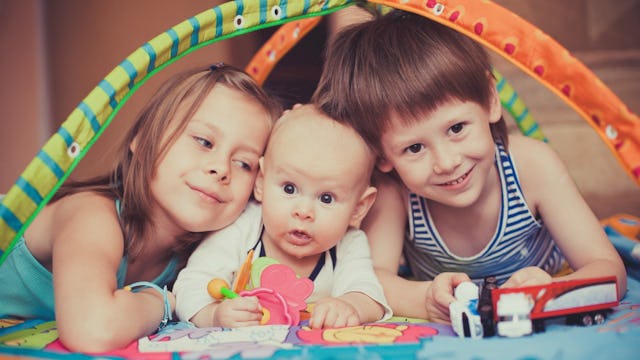Sorry, Middle Child, Birth Order Science Is Kind Of BS

I’m the baby of the family, and I married another baby of the family, and I’ll be the first to admit we both share many of those “baby of the family” personality characteristics that birth order science alleges. I say “alleges” because the fact is there are actually very few scientific studies on birth order science, and how much and to what extent when we are born into a family (whether we are the firstborn, the middle child, or the baby) has a noticeable and identifiable effect on, or determination of, our most basic personality traits. Yet we seem to still place an emphasis on the effect and nuances of birth order science, even referring to our kids in relation to those assumptions.
I know I’ve personally found myself saying, “Oh, he’s the firstborn, so of course he’s a natural leader and Type A. And “He’s my youngest, a total go-with-the-flow jokester, and he gets away with whatever he wants to.” And “Yep! That’s my middle child, quiet, passive, and ultra-agreeable.”
Did my kids get that way just because of where they were born in the lineup? Or was it the specific way we parented them? Would their personalities be the same if they came in a different order?
A recent study concluded that what order our children are born can even determine their level of intelligence. Researchers from the University of Edinburgh, the Analysis Group, and the University of Sydney found that children who were born first typically scored higher on IQ tests than their younger siblings.
According to the study, parents were “less likely to partake in mentally stimulating activities with their younger children, meaning they may not have developed the same thinking skills as the older sibling.” Uh, because DUH, we simply don’t have the amount of free time with subsequent children that we had when we only had one child. (It took a study to conclude this?)
Firstborn children around the country salivated, quickly sharing the study on their social media channels, relentlessly pissing off middle and youngest children. But that’s just what they always do, right?
The idea that firstborn children are inherently smarter was first proposed by a 19-century scientist, who noticed that a majority of his scientist colleagues were all firstborn children. Then in the late 1920s, Alfred Adler, one of Freud’s colleagues, suggested that firstborns feel “dethroned” when a younger sibling comes along. He summarizes that “this results in their neurotic and self-centered tendencies, but also lends them to being neutral born leaders.” He went on to theorize that the youngest of the family ends up “spoiled, outgoing, and immature, while a middle child would be independent, rebellious, and relatively healthier.”
If you think that sounds like someone who is complaining about the attention their siblings are getting, you’re right — because Adler was a middle child.
Yet even though the science of birth order is limited, as a society we still embrace its assumptions, and boast about how our kids totally fit the birth order mold. Turns out, maybe we’ve been wrong this whole time. A 2015 study looking at more than 20,000 adults and comparing them with their siblings found that birth order had little effect on “extraversion, emotional stability, agreeableness, conscientiousness, or imagination, a subdimension of openness.”
Another study in the Journal of Personality agrees and found little evidence that personality directly correlates with birth order when studying over 350,000 high school-aged kids. Researchers from that study stated, “[Birth order] does not seem to be an important consideration for understanding either the development of personality traits or the development of intelligence.”
So why do we still believe it? Turns out birth order science (or non-science) can act in very much the same way horoscopes do — meaning, we’re presented with just enough vague traits that we are able to project some or all of them onto ourselves. Therefore, even a small amount of inherent leadership abilities of a firstborn turn into them viewing themselves a “natural born leader” because they simply are the firstborn. And since we’ve believed the validity of birth science for so long, society keeps telling the same story. Which really means one thing…
Sorry middle child, but no matter what, you’re still not getting a break.
This article was originally published on